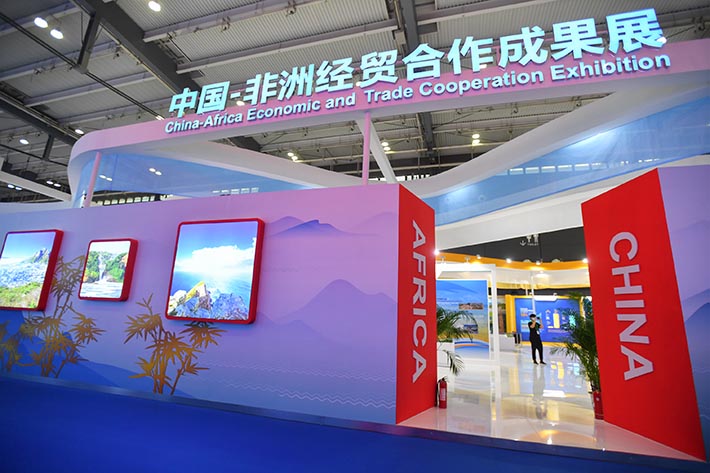|
||||||||||
| Home Nation World Business Opinion Lifestyle ChinAfrica Multimedia Columnists Documents Special Reports |
|
||||||||||
| Home Nation World Business Opinion Lifestyle ChinAfrica Multimedia Columnists Documents Special Reports |
| ChinAfrica |
| Vital Links |
| Hunan Province takes innovative steps to deepen Sino-African economic and trade cooperation |
| By Li Xiaoyu | VOL. 15 July 2023 ·2023-06-25 |

The China-Africa Economic and Trade Cooperation Exhibition is held during the second China-Africa Economic and Trade Expo in Changsha, Hunan Province, on 26 September 2021. Many economic and trade cooperation cases between Hunan and Africa were displayed
It is believed that central China’s Hunan Province began to trade with Africa as early as 1,200 years ago. In 1998, more than 50,000 pieces of Changsha porcelain from the Tang Dynasty (618-907) were found in the hull of a ship that had been lying in Indonesian waters for more than 1,000 years. It is said that the merchant ship Black Stone sank on its way from Changsha, now the capital of Hunan Province, to North Africa.
Today, Hunan continues to maintain close ties with Africa and their economic relationship has deepened thanks to a number of new initiatives launched since the establishment of the China (Hunan) Pilot Free Trade Zone (FTZ) in September 2020. Changsha Customs District reported that bilateral trade in the first four months of this year rose 90.4 percent year on year to a record 22.04 billion yuan ($3.09 billion). Hunan is also home to the Pilot Zone for In-depth China-Africa Economic and Trade Cooperation, which was established according to the nine programmes unveiled at the Eighth Ministerial Conference of the Forum on China-Africa Cooperation held in November 2021.
Barter system
In early 2021, South African company Takela Group wanted to buy $4 million worth of small commodities and construction materials from a Chinese source. However, the Chinese supplier was worried that it would not be able to receive the required payment in US dollars.
In July of that year, five containers of red grapefruits from South Africa landed at Yangshan Port in Shanghai, breaking the deadlock between the two sides. The fruits were handed over to the Chinese trader after passing quarantine, inspection and customs clearance. The first barter trade in the Hunan FTZ was completed, with 2,000 tonnes of South African grapefruits exchanged for Chinese commodities of equal value.
Since the inception of the Hunan FTZ, the province has explored the possibility of using a barter system to overcome the difficulties in obtaining foreign exchange that many African companies face. With this in mind, the China-Africa (Hunan) Barter Co. was established in February 2021 and has been promoting barter trade between China and Africa ever since.
For example, it helped China’s largest seed exporter, Yuan’s High-Tech Seed, to solve the complex problem of payment in trade with its Malagasy customers. The Chinese exporter had to keep a significant amount of Malagasy currency Ariary because the latter did not have enough foreign exchange reserves, which made it difficult to remit fund to China. Thanks to the new barter model, the local subsidiary of Yuan’s High-Tech Seed was able to buy Malagasy mica using the payment received in Malagasy Ariary. These minerals were then shipped to China-Africa (Hunan) Barter Co., which paid the Chinese exporter in Chinese currency renminbi after selling minerals in the Chinese market.
Twelve barter contracts in four African countries have already been executed by China-Africa (Hunan) Barter Co. The company also launched China’s first business-to-business service platform for international barter in January 2022. At the time of writing, about 200 customers had registered on the website.
“Our barter concept has enabled African countries not only to save foreign exchange on their imports, but also to increase their exports,” said Chen Xihe, the company’s CEO. Although this pilot programme is still in its early stages, she believes that there is great potential demand for bartering from Chinese exporters to Africa, and the platform will continue to be useful. She therefore has high hopes for the future of the barter trade.

African artists perform during the launch ceremony of the China-Africa E-Commerce Livestreaming Incubator at the Gaoqiao Grand Market in Changsha, Hunan Province, on 25 December 2020 Digital transformation
Supply chain for Africa
China is the world’s largest importer of non-resource commodities. Before the launch of the first China-Africa Economic and Trade Expo (CAETE) in 2019, only 2.5 percent of African non-resource commodities were exported to China. According to African envoys, this number increased 10-fold in just one year after the event.
This increase is closely linked to the construction of the African Non-Resource Product Distribution, Trading and Processing Centre. According to the Hunan Provincial Department of Commerce, this is an important initiative taken within the framework of the Pilot Zone for In-depth China-Africa Economic and Trade Cooperation.
One of the first sub-centres established under this project is the Coffee Street at Gaoqiao Grand Market in Changsha. Since it opened in August 2020, more than 20 coffee traders, producers and brands have set up shops there. Coffee beans from African countries such as Ethiopia, Kenya, Rwanda and Tanzania are displayed there.
At Jing Jianhua’s coffee shop Coffee Z, a cup of coffee costs between 8 and 15 yuan ($1.1 and $2.1) and is made from high-quality African coffee beans, according to Jing. The roastery owes its good value for money mainly to the complete industrial chain of African coffee formed by the distribution, trading and processing centre.
It can communicate directly with coffee producers in Africa, which not only eliminates intermediate costs and reduces transport time, but also guarantees the quality of the coffee beans. At the same time, Coffee Z is using the centre’s distribution network to set up a system that integrates roasting, packaging and the supply chain. The company has already opened a number of stores in Changsha’s main business districts and is committed to promoting coffee culture to local consumers.
According to Xiao Xiangdong, an official with the Hunan FTZ, the industry chain has covered six African non-resource products, including coffee, nuts, sesame seeds, peanuts, wood products and dried chilli peppers.
The chilli peppers were allowed to enter the Chinese market after the signing of a memorandum of understanding on dried chilli trade between the governments of China and Rwanda in March 2021. Under the memorandum of understanding, Rwandan suppliers will export 50,000 tonnes of dried chillies to Hunan within five years. In August 2021, Changsha Customs issued an inspection and quarantine certificate for the first batch of 200 kg of dried chillies from Rwanda. After arriving at the distribution, trading and processing centre, they were processed into hot sauce with fermented soybeans from Hunan. Due to its unique flavour, the Rwandan chilli became a popular product at the second CAETE in 2021.
Digital transformation
The chilli from Rwanda also owes its popularity to the China-Africa E-Commerce Livestreaming Incubator, which opened in December 2020 at the Gaoqiao Grand Market in Changsha. With more than 100 presenters and 40 livestreaming rooms covering 12,000 square metres, the incubator continuously showcases African products, such as chilli from Rwanda, on various social network platforms. It is the first livestreaming base for African products in China.
During the second CAETE, the incubator also held the first Livestreaming E-Commerce Festival for African Commodities. Within three days, 62 special livestreaming sessions were organised around the clock to promote African specialty products such as coffee from Ethiopia, sesame seeds from Tanzania, white peppers from Cameroon and wine from South Africa.
Since the first CAETE, Hunan has already laid the foundation for the digital transformation of Sino-African trade. Kilimall, an African e-commercial trading platform, was invited to build and operate an online platform for CAETE to provide Africa with a technical solution to “buy from the world” and “sell to the world” with a single click.
According to the online fair organiser, its platform provides a range of services for businesses throughout the year, such as presentation, marketing, payment, financing and logistics, with the aim of facilitating trade between China and Africa and bringing more African goods to the Chinese market.
During the second CAETE, Kilimall built the second online trade platform for the expo. More than 500,000 orders were processed and the transaction value exceeded 100 billion yuan ($14 billion).
| About Us | Contact Us | Advertise with Us | Subscribe |
| Copyright Beijing Review All rights reserved 京ICP备08005356号-5 京公网安备110102005860号 |